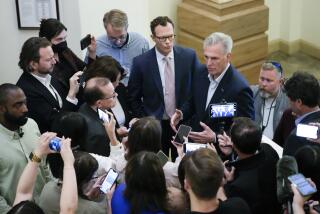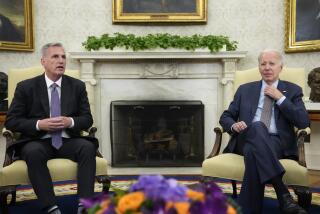White House Pushes Oil Firm Tax Breaks : Budget: Democratic and Republican negotiators continue marathon deficit talks. They hope to reach an agreement by Monday.
ANDREWS AIR FORCE BASE, Md. — As budget negotiators headed into the second day of marathon deficit reduction talks Saturday, the Bush Administration pressed for an agreement that would provide tax breaks for the oil industry and refused to rule out higher gasoline taxes.
Against long odds complicated by a weakening economy and the Persian Gulf crisis, the negotiators hoped to reach an agreement by Monday to raise taxes and cut spending enough to slash the 1991 deficit by $50 billion and to save roughly $500 billion over the next five years.
White House Chief of Staff John H. Sununu, in a televised interview from Helsinki, said the Administration was “asking for some additional incentives, economic incentives” for oil drilling as part of any bipartisan budget accord for the 1991 fiscal year.
While noting that the White House was not “enthusiastic” about Democratic proposals to raise gasoline taxes, Sununu acknowledged in a Cable News Network interview that such a tax increase could be “part of the package” worked out by negotiators.
Many observers had considered higher energy taxes unlikely, particularly in light of widespread public objections to recent gasoline price increases caused by the disruption of oil shipments from Iraq and Kuwait.
Meeting in self-imposed isolation at this air base 10 miles from Capitol Hill, Republicans and Democrats held separate sessions Saturday to review the other side’s opening positions before resuming full-scale negotiations together.
As the day went on, the negotiators--including White House Budget Director Richard G. Darman, Treasury Secretary Nicholas F. Brady and more than a dozen lawmakers from both parties--ejected staff members from the meetings and later forced reporters to leave the base.
The negotiators had a serious “blow-up” in mid-afternoon Saturday because of the sharp differences between Republicans and Democrats over the level of defense spending and the amount of cuts in domestic programs, one source said.
But tempers cooled later and the talks got back on track. “There’s a certain increasing sense of optimism,” according to a source close to the discussions. “We are making progress.”
After months of desultory talks and a five-week summer break, the bargaining is finally getting serious, participants said.
“They’re feeling each other out,” said one source close to the negotiations. “It’s getting close to make-or-break time.”
“It’s what I call the basketball theory of politics,” said Sununu, who is in Helsinki for President Bush’s meeting today with Soviet President Mikhail S. Gorbachev. “It’s all done in the last two minutes.”
But negotiators must still pass major hurdles if they are to achieve a long-sought budget package that would make a substantive dent in the federal deficit. Without an agreement, the deficit for the fiscal year that begins on Oct. 1 is expected to soar to as much as $250 billion.
With the public largely disgusted with the endless maneuvering over the deficit but ambivalent over what to do about the situation, Democrats continue to fear blame for the politically painful spending cuts needed to narrow the budget gap. Republicans, despite Bush’s decision to renege on his campaign pledge against higher taxes, remain sharply divided over raising taxes that would harm their supporters.
“What do we cut? What do we reform on the domestic side? That’s always the most difficult,” Sen. Pete V. Domenici (R-N.M.) said just before negotiations opened Friday.
Following the morning caucuses, bargaining between Republicans and Democrats resumed in the early afternoon. According to aides, who spoke on condition they not be identified, Democrats continued to demand deeper cuts in the Pentagon budget than Republicans want, while GOP bargainers said Democrats were reluctant to accept substantive cutbacks in major benefit programs such as Medicare and farm subsidies.
Democrats opened discussions Friday with a proposal to raise gasoline taxes by seven cents a gallon, phase in a new energy tax, impose higher income taxes on those earning more than $200,000 a year and increase other taxes.
Unless Congress acts to change the Gramm-Rudman budget law, failure to approve a package by Oct. 1 is supposed to trigger more than $100 billion in automatic spending cuts. If left in place for more than a short time, the cuts would have a devastating effect on a wide variety of programs.
More to Read
Sign up for Essential California
The most important California stories and recommendations in your inbox every morning.
You may occasionally receive promotional content from the Los Angeles Times.










